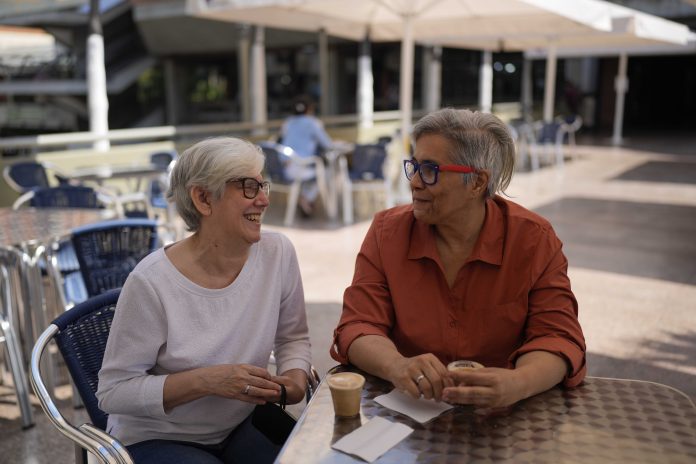
By REGINA GARCIA CANO
Associated Press
CARACAS, Venezuela (AP) — Ana Margarita Rojas and Elena Hernáiz have shared their lives for more than three decades and raised a son together. Their neighbors in Venezuela’s capital recognize them as a couple, never questioning them when they refer to each other as “mi esposa” — “my wife.”
Their social acceptance, however, does not translate into legal recognition. Venezuela remains on a shrinking list of South American countries that do not allow same-sex marriages. This despite the fact that Venezuela’s highest court has had seven years to rule on a key case and President Nicolás Maduro has asked lawmakers to consider the matter.
This inaction has left couples and activists wondering whether a country steeped in a political, social and economic crises will ever grant them the right to marry. Many see a government that ignores them and an opposition that prioritizes other issues.
“We are in a country where being a citizen is already an uphill struggle, being recognized as a minority citizen is a higher uphill struggle,” said the 59-year-old Rojas. “Here, there is great ignorance and great disrespect for citizens … So, if I don’t recognize you as an opponent, I don’t recognize you as a professional, I don’t recognize you as a citizen, I’m not going to recognize you as LGBT.”
Venezuela’s Supreme Court of Justice, one of many government bodies seen as loyal to Maduro, formally agreed in 2016 to weigh in on the matter after receiving a case a year earlier, but it has not issued a ruling.
A previous decision determined that the constitution does not prohibit or condemn same-sex relationships, but it does not extend them any protections because marriage is a union between a man and a woman. It also determined that it is up to lawmakers to create a protection for couples through a concept other than marriage.
Some couples have traveled abroad to marry despite knowing their union would not be recognized upon their return to Venezuela. Others, like Rojas and Hernáiz, have obtained legal documents that allow them to make emergency medical decisions for the other, gives them rights over each other’s property, including bank accounts, and custody of children.
Venezuela’s transition to socialism beginning in 1999 under Maduro’s mentor, the late President Hugo Chávez, and the crisis that undid the country after his death has kept Venezuelan society — and its government — from debating the issue as has occurred in other Latin American countries.
“They have not allowed us to have the serious discussions of the 21st century,” Tamara Adrian, an attorney and former opposition lawmaker, said referring to Chavez’s disciples, called Chavistas. “For the last almost two and a half decades, they have trapped us in a dilemma between capitalism and socialism. In the 21st century, it is totally, I would say, superfluous as a discussion. In the 21st century, (the discussion) is development with inclusion, there is nothing else, and that means eliminating all the barriers that exist.”
In Latin America, court decisions have legalized same-sex marriage nationally in Brazil, Colombia, Costa Rica, Ecuador and Mexico, while legislation led to the same result in Argentina, Uruguay, and last year, Chile, according to the Human Rights Campaign.
Maduro in October 2020 asked the National Assembly to debate same-sex marriage legislation during its following term. He cited comments Pope Francis made in a documentary in which he backed civil unions for homosexual couples.
“I have friends and acquaintances who are very happy with what the Pope said yesterday,” Maduro said at the time. “I will leave that task, the task of LGBT marriage, to the next National Assembly.”
The assembly, under the ruling party’s control, has not debated the issue.
Venezuelan society, mostly Roman Catholic, is conservative on some issues and liberal in others. It rarely condemns homophobia. High-ranking government officials — even Chávez at one point — often mock and insinuate their political opponents are homosexuals to try to disqualify them despite claiming to support the LGBT community.
Adrian, who became Venezuela’s first transgender lawmaker, said some of the opportunities to advance progressive causes ended when many young professionals left the country because of the crisis.
The Chavista movement has also sought the support of evangelicals, but it is not clear how far this has influenced the lack of action on the same-sex marriage debate.
Activists earlier this year hosted a protest outside the Supreme Court to demand justices take up the languishing case. But in a country where demonstrations can be shut down by authorities without notice, no more than 20 people participated, and only a few chanted, their complaint that “procedural delay is patriarchal violence” barely audible from less than a block away.
Activist Tristán Key attended the rally. At 19, he uses TikTok videos filmed in his bedroom, decorated with a variety of LGBT flags, to advocate for the rights of the community, including marriage.
The transgender man said the demand for the approval of same-sex marriage in Venezuela is not only about legalizing their unions on paper but also about protections against discrimination. Before filming a new video, he acknowledged that people in Venezuela have died of hunger and lack of medical supplies during the crisis but noted that “the hatred that exists in this country” has also been deadly.
Unlike Rojas, Hernáiz and Adrian, Key has no reference to a pre-socialist Venezuela. The acrimonious back and forth between the ruling party and opposition is all he knows as government. He is hopeful that one of the two sides will make same-sex marriage legal within the next 10 years.
“My activism is nonpartisan and my priority as an activist is LGBTQ rights,” Key said. “I don’t care who gives it to me, whether it’s Maduro or (someone else), as long as they give it to me.”



















